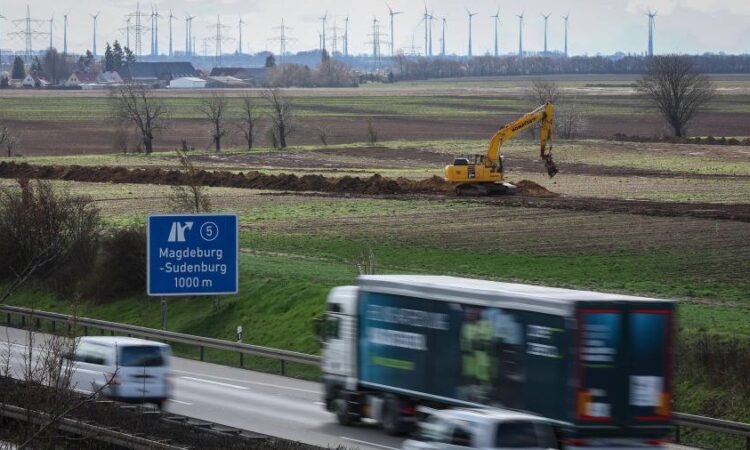
Germany received record levels of foreign direct investment last year, official statistics show, with the boom driven by a rise in UK companies setting up operations in Europe’s largest economy to keep a post-Brexit toehold in the EU.
FDI into Germany totalled €25.3bn last year, up 261 per cent from €7bn in 2021. The biggest sources of investment were the US, which accounted for 279 projects, Switzerland second and the UK third. The total of 170 FDI projects originating in the UK was 21 per cent up on 2021.
“For British companies, it’s particularly important to have a foothold in the EU after Brexit,” said Robert Hermann, chief executive of Germany Trade & Invest (GTAI). About a third of the projects announced by UK companies were in financial services and 21 per cent in IT, the economic development agency said.
One of the biggest UK investments was by Frasers Group, the owner of Sports Direct and other high-street brands, which announced in April last year that it was spending €300mn on a new distribution centre at Bitburg airport in western Germany that would become its European headquarters.
UK company Mura Technology announced last year it would build a chemical recycling plant in the eastern town of Böhlen that would turn 120,000 tonnes a year of plastic waste into oil. Proton Motor Power Systems also said it was expanding its Puchheim plant in southern Germany, which produces fuel cell stacks and hydrogen fuel cell engines.
And THEMPC, a promotional and branding company, set up an operations hub in Munich. It will allow the company to produce and distribute printed goods and bespoke packaging inside the EU without customers needing to pay extra duties and taxes.
GTAI officials said the UK companies setting up shop in Germany were those attracted to the country’s traditional strengths in cars, manufacturing and logistics.

While FDI into Germany reached a peak last year, officials expect the total volume to decline this year, as President Joe Biden’s Inflation Reduction Act lures investment in green technologies away from Europe to the US.
“When it comes to new decisions, the numbers are dropping,” said Hermann. “The trend we’re seeing is that there will be fewer of them.”
He identified the IRA as a potential factor. “We assume it will have an effect on investment in Europe and Germany,” he said.
Germany has become a magnet for semiconductor and battery companies, and a beneficiary of EU plans to increase the bloc’s self-sufficiency in key technologies and its resilience to potential disruptions to Asian supply chains.
Much of the increase in FDI was accounted for by US chipmaker Intel’s plan to build a €17bn factory in the eastern German city of Magdeburg, and also by a €4.5bn investment by Swedish start-up Northvolt in a new battery factory in the northern state of Schleswig-Holstein.
But even without Intel’s contribution, FDI would have stood at €8.3bn — higher than the figure for 2021.
Hermann said investors were drawn to Germany by the “size of its market, its secure legal framework, highly qualified workforce, infrastructure and R&D environment”. By type of project, 35 per cent of investments were in sales, marketing and support, 25 per cent in business services and 15 per cent in manufacturing and R&D.
GTAI’s figures are a lagging indicator. The huge increase in energy prices last year caused by Russia’s war in Ukraine made Germany a much less attractive place to do business than it was before the invasion. While gas prices are now close to prewar levels many companies are still looking elsewhere, particularly the US. The IRA provides $369bn of subsidies and tax credits for clean energy technologies.
Hermann said energy prices did play a role for big international investors, but other factors were more important. “Not every project is energy intensive,” he said. “Many are driven by personnel costs, and by [proximity] to important R&D partners, suppliers and customers.”
The agency noted that inbound investment from China was in retreat, with only about 141 projects announced last year — the lowest figure in eight years. Despite the decline, China was the fourth-biggest foreign investor.
Some experts have attributed the decrease to tightened restrictions on M&A activity by Chinese companies in Germany. But Hermann blamed the decline on the aftermath of the Covid-19 pandemic, which had made it harder for Chinese executives to travel to Germany.






